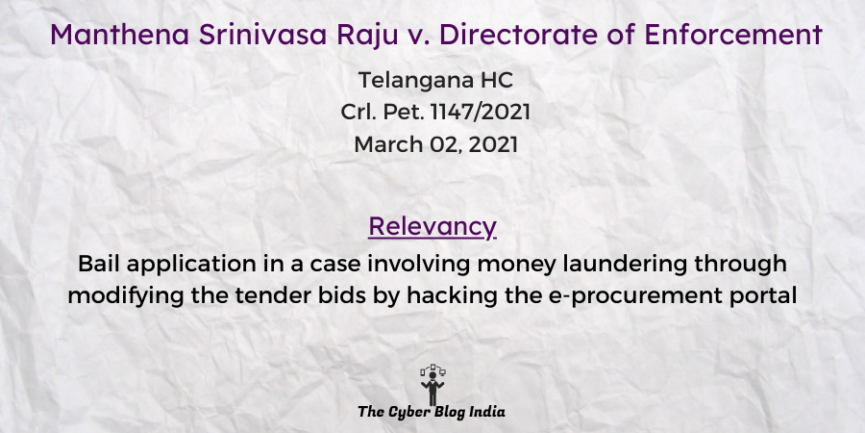Manthena Srinivasa Raju v. Directorate of Enforcement

Manthena Srinivasa Raju v. Directorate of Enforcement
In the High Court of Telangana
Crl. Pet. 1147/2021
Before Justice G. Sri Devi
Decided on March 02, 2021
Relevancy of the case: Bail application in a case involving money laundering through modifying the tender bids by hacking the e-procurement portal
Statutes and Provisions Involved
- The Information Technology Act, 2000 (Section 66)
- The Indian Penal Code, 1860 (Section 120B, 420, 468, 471)
- The Code of Criminal Procedure, 1973 (Section 437, 439)
- The Prevention of Corruption Act, 1988 (Section 7(c), 13(2))
- The Prevention of Money Laundering Act, 2002 (Section 3, 4)
Relevant Facts of the Case
- The Chief Secretary of Madhya Pradesh directed the Economic Offences Wing (EOW) of Bhopal to investigate unauthorised access in three Madhya Pradesh Water Corporation (MPWC) tenders on the MPSEDC e-portal.
- A preliminary enquiry by the EOW revealed that three MPWC tenders worth ₹1769 crores were manipulated. The perpetrators changed them to the bid price of the other three companies to make them the lowest bid.
- Similarly, various tenders of different government departments were tampered due to which specific companies became the lowest bidder and got undue benefits.
- Hackers infiltrated the e-portal system and gained unauthorised access by using the Digital Signature Certificates of Tender Opening Authorities from the affected departments.
- The investigation suggests a criminal conspiracy among all the accused to gain illegal benefits. The estimated value of these tampered e-tenders is a staggering ₹ 80,000 crores.
- This evidence constitutes a prima facie case for money laundering and corruption. Consequently, the EOW registered an FIR against 20 companies/individuals suspected to be involved in this alleged scam.
Prominent Arguments by the Advocates
- The petitioner’s counsel submitted that:
- The petitioner is not an accused but a suspect. He emphasised that the accused is presumed innocent until proven guilty.
- The tenderers did not gain any monetary benefits as the employer cancelled the tender notification after registering the complaint.
- The petitioner is a law-abiding and respectable citizen. He would abide by any conditions that the court will impose.
- The respondent’s counsel contended that:
- The Prevention of Money Laundering Act, 2002 offences are cognisable and non-bailable. Thus, the present bail is not maintainable.
- The petitioner will influence the witnesses, which could cause irreparable damage to the progress of the investigation.
- The court considers economic offences a special class of offences. Thus, the court does not grant bail based on ordinary principles.
Opinion of the Bench
- The offence is non-bailable but not punishable with death or imprisonment for life.
Final Decision
- The court granted bail to the petitioner, subject to conditions.
